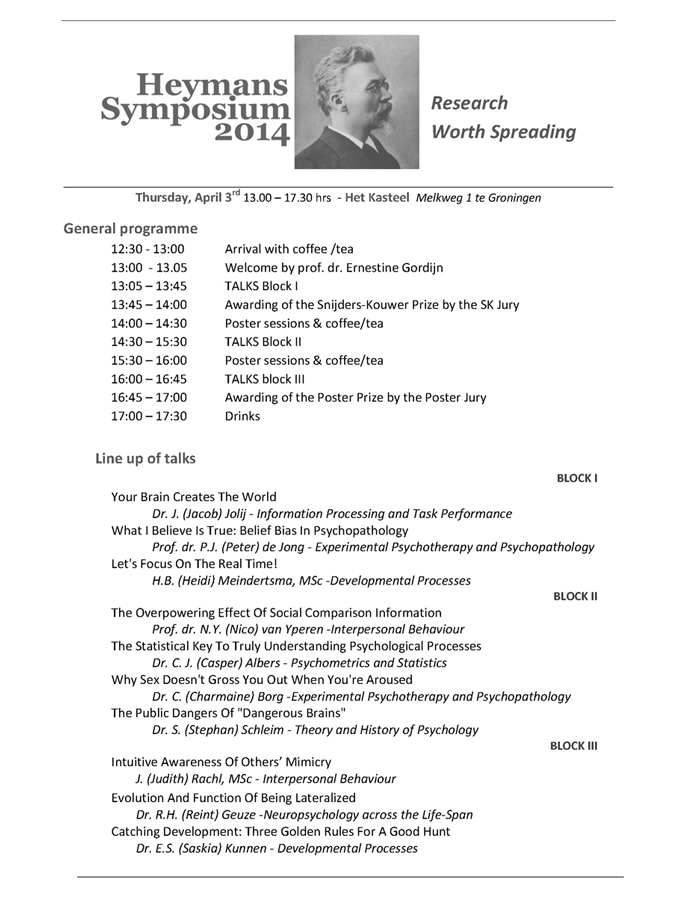2014 Heymans Symposium
Het Kasteel' was filled with an enthusiastic audience. The symposium format, the talks, poster presentation and drinks afterwards were a great succes.
Have a look at the article 'Research worth spreading! A postscript on the Heymans Symposium' on Mindwise, the psychology blog.
Heymans Talks line up (see all video's on the Heymans talks page)
All talks are also published at our very own YouTube channel, check out the 2014 Heymans Talks playlist
Below you find the programme with the line up of talks.
Your Brain Creates The World
Dr. J. (Jacob) Jolij - Information Processing and Task Performance
What I Believe Is True: Belief Bias In Psychopathology
Prof. dr. P.J. (Peter) de Jong - Experimental Psychotherapy and Psychopathology
Let's Focus On The Real Time!
H.B. (Heidi) Meindertsma, MSc -Developmental Processes
The Overpowering Effect Of Social Comparison Information
Prof. dr. N.Y. (Nico) van Yperen -Interpersonal Behaviour
The Statistical Key To Truly Understanding Psychological Processes
Dr. C. J. (Casper) Albers - Psychometrics and Statistics
Why Sex Doesn't Gross You Out When You're Aroused
Dr. C. (Charmaine) Borg -Experimental Psychotherapy and Psychopathology
The Public Dangers Of "Dangerous Brains"
Dr. S. (Stephan) Schleim - Theory and History of Psychology
Intuitive Awareness Of Others’ Mimicry
J. (Judith) Rachl, MSc - Interpersonal Behaviour
Evolution And Function Of Being Lateralized
Dr. R.H. (Reint) Geuze -Neuropsychology across the Life-Span
Catching Development: Three Golden Rules For A Good Hunt
Dr. E.S. (Saskia) Kunnen - Developmental Processes
Prizes
The Snijders-Kouwer Award was granted to Jonna Brenninkmeijer, former PhD student of Theory and History of Psychology, for her article Neurofeedback as a dance of agency. BioSocieties 8 , 144-163. doi: 10.1057/biosoc.2013.2

Stacey Sanders, former PhD student with Organizational psychology, won the Poster Prize with the poster entitled

'Only Harm the Abusive Boss: Employee Deviance as a Response to Abusive versus Ethical Supervision and the Mediating Role of Anticipated Guilt'
"Employee deviance may have costly consequences for organizations. Previous correlational research suggests that this undesirable employee behavior may have its roots in how employees are treated by their leaders: abusive supervisors elicit more employee deviance than ethical supervisors do. The present research puts forward the anticipation of experiencing guilt as a mechanism explaining why employees deviate against abusive bosses but not against ethical ones. In a series of five studies we demonstrate that leaders’ treatment (abusive vs. ethical) is a precursor of employees’ supervisor-directed deviance and that employees' anticipatory guilt mediates this relationship. Our findings add to the literature by providing causal evidence for the relationship between supervisor behavior, anticipated guilt, and employee deviance, and suggest that affective forecasting can be considered a critical factor in explaining employee behavior."

| Last modified: | 02 February 2022 11.56 a.m. |
